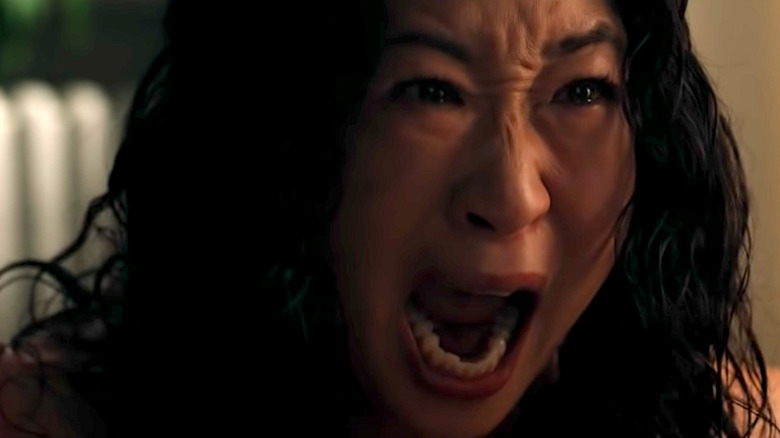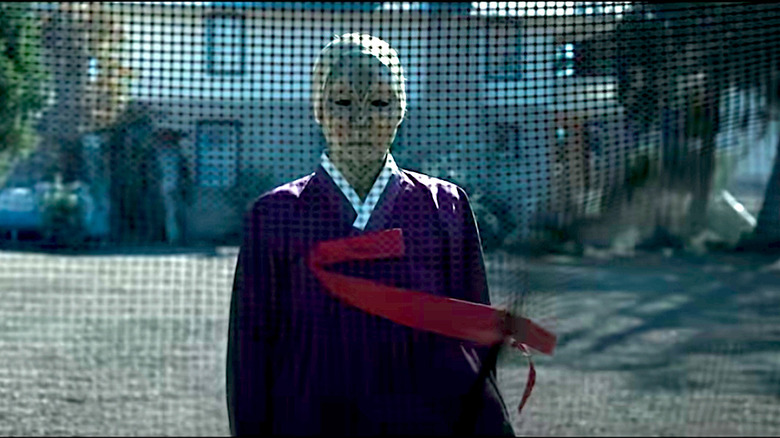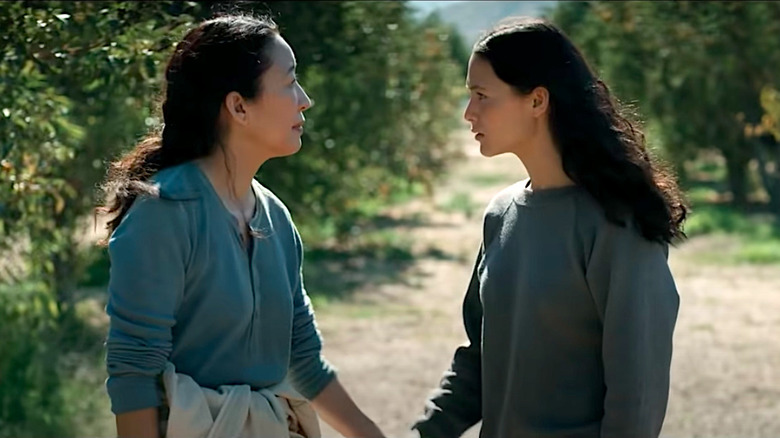The Sandra Oh Horror Movie You'll Want On Your Radar
For some people, there is nothing more terrifying than turning into your mother. In fact, the psychological repercussions of inheriting your mom's worst traits can sometimes feel like the stuff of horror movies. In "Umma," the new horror film from director Iris K. Shim, the dazzling Sandra Oh plays Amanda, a Korean American mother with a desperate desire to escape her own family's past. She lives on a secluded farm with her teenage daughter, Chris (played by Fivel Stewart), where the two work to maintain their business as honeybee farmers.
Amanda and Chris live a simple life without electricity or technology of any kind. Chris is homeschooled by Amanda, and the only friend the two share is a man named Danny who helps them sell their honey locally. Their sheltered life seems idyllic until the day Amanda's Korean uncle shows up to deliver her recently deceased mother's ashes. He instructs Amanda to give her mother a proper burial, or her soul will become angry, haunting her and her daughter for the rest of their lives.
Soon, Amanda is wrapped up in the horrible memories of her umma (which means "mother" in Korean), and she eventually begins to fear she is turning into the mother she has worked so hard to resist. What "Umma" lacks in suspense and fright, it makes up for in the way it explores the complexities of generational trauma and the many ways it profoundly affects motherhood. For this reason alone, it is a horror film that's not to be missed.
The rise of the Asian American mother
The month of May pays tribute to both mothers and the AAPI community, making "Umma" the perfect flick to celebrate both. Mothers are often the subject of horror films, and with the recent releases of "Turning Red" and "Everything, Everywhere, All at Once," the Asian mother has gotten a lot of screen time. Frequently categorized under the often offensive term "tiger mom," Asian mothers on screen are often presented as too set in their strict, traditional ways. But recently, with the release of entertainment like "Fresh Off the Boat," "Kim's Convenience," and Ali Wong's stand up comedy shows, the portrayal of the Asian mother has started to deepen and change in mainstream media.
In a recent interview for NBC News, director Iris K. Shim explained how "Umma" was influenced by her own experience with her Asian mother:
"I saw my mom bending over backwards to take care of her parents and take care of her husband's parents. There was a moment where I saw my mom as the daughter. There is this sort of back and forth of mothers taking care of daughters and daughters taking care of mothers. It is almost this symbiotic kind of relationship."
"Umma" definitely reflects this sort of symbiosis, as Amanda and Chris both work to nurture and care for one another throughout the film.
Los Angeles Times film critic Justin Chang recently wrote a compelling article about the Asian (North) American mother and portrayals on screen. He wrote that while Asian American mothers are often portrayed as women who "rigorously policed your academics, your extracurricular activities and your sorry excuse for a social life," this does not make these depictions "mom-oliths," the end all, be all of what an Asian American mother is. "Umma" is a film that seeks to add new dimension to the definition of an Asian American mom, and in doing so, it broadens the narrative surrounding the very real effects of generational trauma and the Asian American experience.
The true horror in Umma
For the Asian American community, "Umma" is a wonderful addition to the handful of movies working to bring Asian American characters and their stories to center screen. Iris K. Shim told NBC News: "Growing up, whenever I did see Asian faces on screen, either they were films from Asia or they were small bit characters that were usually the butt of the joke." Her film reverses the trend, centering the story on the Asian American experiences of Amanda and Chris. At one point, Amanda tells her uncle the reason her daughter does not know Korean is because she is American, a complex moment that shows how, for many AAPI families and their children, embracing one culture often means rejecting another.
Reviews for "Umma" have been mixed. Some find the film to be "boring" and too reliant on jump scares to deliver suspense. Others see it as an impressive attempt at telling the Asian American story through the lens of horror. It's true that the film falls short in the department of classic horror frights, which may come as a shock, seeing as horror icon Sam Raimi helped produce the film. Still, this doesn't mean the horror is lacking, though audiences will have to dig deeper than jump scares and gory special effects to get to the root of the terror.
The true horror of "Umma" is hidden within the idea that we are doomed to repeat our parents' mistakes. Amanda fears she will become just like her overbearing, strict, potentially abusive mother, and she does not want to pass down the decades of trauma associated with her mother's painful immigration to America. NBC News sums up the complex struggles facing Amanda and Chris, describing them as "the guilt often passed from parent to child, the lack of acknowledgement of mental illness in immigrant families and the silent struggle of Asian mothers." If we look at "Umma" through this particular lens, what we will find is a movie doing a lot of work to shine light on the experiences of the AAPI community.


